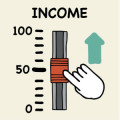
Do you take projects which require lower than your usual freelance rates? Yes? No?
I don’t know anyone who has not been underpaid at some point. Similarly, I don’t know a freelancer who has not applied to a project the budget for which turned out to be way lower than expected. Then what? Do you take the job although at a lower rate?
I have blogged before about my work principles as a freelancer – and I stand by them. No one, freelancer or not, should ever compromise with their integrity and work ethics. It should not surprise you then when I say – we should do whatever necessary to sell our services at the freelance rates we consider fair. Let’s see how we do that.
Freelance rates when we apply to new projects
When applying to a new project, you should know in details how much it costs to complete each and every stage of the project. If your freelance rates are higher than the client’s expectations, he or she may ask for a detailed account why your cost is so high.
You should be able to say how much time you’d need for each part of the project, what steps you’d take toward completion, how much each step costs, how your work is unique or better than the rest of the applicants…
Your ability to break the project costs prognosis in such detail shows that you have done this type of work not once or twice, and you know the ins and outs of your work. Besides, experience costs money, right? 😉
What’s even more important – it shows that you take seriously your work; seriously enough to plan it ahead – to the smallest detail.
Clients value this quality in a freelancer. (If you’ve forgotten, read about the qualities a successful freelancer has – time management and planning your work is one of them!).
And if this particular client does not appreciate your planning skills and your time – well, probably they were not a good client and you shouldn’t be working with them anyway. 😉
Clients who don’t respect other people’s time, efforts and hard work are no good clients.
When your freelance rates change because of external factors
Sometimes you are working with the same client for months, even years. However, your freelance rates should not remain unchanged during the course of your cooperation for such a long period of time. The reasons may be different – to name a few:
- the strength of the USD currency or inflation is changing
- your role in the project has changed
- your skills have improved with time and practice
- your services are in higher demand
Of course, you can continue working at the same freelance rates – I am saying you shouldn’t.
If you work today at the freelance rates you were charging a few years ago when you were starting, chances are you will be making a compromise with your requirements and skills. (Remember that pricing your services too low is one of most common errors newbie freelancers do?) On the other hand – you don’t want to lose a long-term client over a few dollars. So what do we do?
There isn’t a right answer – every situation is different. It depends on your niche of expertise, on your skills, on the type of work you do, on the dynamics of your relation with the specific client. However, I can tell you this – initiating a negotiation for updating your freelance rates is the first step.
If you don’t initiate that negotiation, at some point you will start feeling underpaid and undervalued; you will be angry with the client because they are not paying you what you deserve; and you will end up losing that client anyway – yes, over a few dollars.
Asking for a pay raise is not unethical, neither it is unprofessional.
When asking for a pay raise, you don’t beg for more money. You don’t abuse your client’s trust. You simply re-evaluate your skills, work costs, and financial situation. If you have not done this yet – I urge you to.
Evaluating your financial situation and updating your freelance rates should be done yearly.
When you explain to your client what the external factors for which you update your freelance rates, the client will enter the negotiations. When you initiate such conversation, do not approach the client with the expectation that you will get what you want right here and now. No.
The purpose of the initial email or meeting is to put the client in your shoes; to make the client see from your perspective. Negotiating for our freelance rates is a whole different story though – maybe I’ll blog about it next week… stay tuned! 😉





“If you don’t imitate that negotiation, at some point you will start feeling underpaid and undervalued; you will be angry with the client because they are not paying you what you deserve; and you will end up losing that client anyway – yes, over a few dollars.” Well said. One has to tread carefully, but discussing money matters needs to be addressed, or the relationship will sour. Know thy client – learn how to discuss the situation so both of you are happy. Not easy.
Oops, i just saw a sneaky typo in my post thanks to your comment, Leora – “imitate” should read “initiate” – auto-correct, heh?! fixing it now…
On the topic – yes, not easy. Before i became a freelancer, i dreaded money negotiations… that’s why i don;t make a good sales person LOL. But we learn, and i am happy to share what I’ve learnt 😀
I have a client who is the middle man between me and his clients. I do social media management for them. We met when I first started doing this, and I had very low prices for my services. Too low. Eventually I came to explain to my client that I would have to charge more, starting very soon. So we entered negotiations. He asked if he could have the old price on just two more people who he had already talked to and told them the old price, then after that, everyone else would be the new higher price. I agreed. This was a perfect arrangement for us.
There are studies that show that women are far more likely to charge less, and far less likely to ask for a raise. This should not be the case. We need to stop being so compassionate toward the people who need our help. Not that we shouldn’t help people, but we should be paid for our skills and talents. Not used. We’re not slaves. If someone really needs our services, they should pay the price. It’s only fair.
Really? I didn’t know women are less likely to ask for a raise and more likely to charge low. Of course, i know women a traditionally paid lower wages (or so i am told) but i thought it is somewhat a thing of the past… Gender is irrelevant in this era, or at least it should be, especially when it comes to making money. I think we are pretty good at it 😉
On a side-note, Lisha, how is to be working with a middle man? I have never done it primarily because i insist on having direct communication about everything with the client… but curious, were you happy with those contracts with the middle man? 😀
Hmm. I generally do. Of course, I like to make sure the client is happy before asking for a raise.
Is it my imagination or have you changed the look of your website? It looks like mine – same theme, anyway! 😉
hahaha, right, making sure the client is happy is paramount – thanks for the reminder,. Lorraine! 😀 Nonetheless, with long term clients, updating your rates shoudl be done yearly (or more often, depending on your job and relationship).
As for my website looks – it’s your imagination. I have always been with this theme (although i am trying for months to find the time to change it…). I even left a comment about it some time ago on Greg’s blog – i thinkwe were discussing free sites, free themes, etc. – here it is, i guess you missed it 😉 (although you did reply to that comment…)
I can see from the freelance point of view to ask for a raise, but there has to be good reason. You are better off to negotiate a realistic price that will make you and your employer happy from the beginning than coming in low and asking for more later. The last thing you want is the relationship to go downhill and you both lose.
oh, sure, that’s correct, Arleen! I never ever would suggest to apply with low price, get hired and then ask for a raise. No. I hate i when freelancers do that as they ruin it for all of us, both freelancers and clients 😀
However, let’s say you hire me to help you with social media content creation for a couple of hours per week. But then you see how natural i am so you want to expand my role into daily management as well as monitoring of your performance and tweaking your strategy based on that. Now, it is one thing to create content for social media, it is totally different to participate in community management and a third thing – in a higher level strategy planning.
I bet you would agree that a pay raise is due when you ask me to do those new things and to play those new roles on your project, right? 😉
Great post Diana. It’s so challenging trying to determine what rates work and what don’t. Often what starts out as a simple project can get complex. The thing to remember is that no matter how you set the price, if you feel you need to change it, you should. If you feel underpaid but let a relationship go on you may start to express your displeasure in unexpected ways like being slower, less careful, less patient with your client etc. All things that do damage your reputation.
Totally agree, Debra! Thanks for adding to the conversation 😀
I have been guilty of this myself! Not charging enough for some of my clients and I did it just to build up my credibility & reputation. I also must admit that I regretted putting myself in this situation to & when I asked for more money he didn’t want to pay it. But as time goes on you certainly learn from your mistakes.
Hi, Toshiba! I just stumbled upon your comment – I have no idea how i missed this comment up until now for so many months, i apologize 🙂
And yes, your comment raises a good question – when enough is enough? Although i strongly recommend adding value instead of cutting your prices, charging less to build your credibility is understandable – we’ve all been there, it’s par of the learning process.
But we do realize we are selling ourselves short – what we do then? That is what matters and what defines what type of freelancer you are.
I hope by now you are charging what you think is fair to you and you have many happy clients willing to pay you those rates 😉